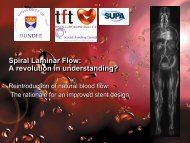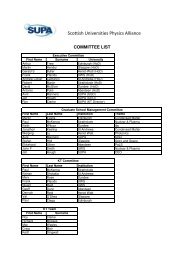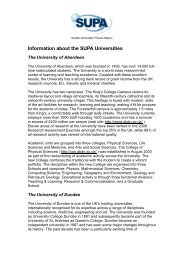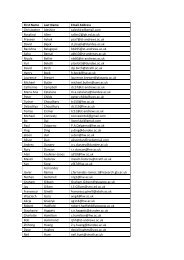Catalogue of Courses & Student Handbook - SUPA
Catalogue of Courses & Student Handbook - SUPA
Catalogue of Courses & Student Handbook - SUPA
You also want an ePaper? Increase the reach of your titles
YUMPU automatically turns print PDFs into web optimized ePapers that Google loves.
Nuclear and Plasma Physics<br />
The Nuclear and Plasma Physics (NPP) theme covers a wide range <strong>of</strong><br />
subject areas, including a number <strong>of</strong> different specialities. Depending<br />
on their individual backgrounds and areas <strong>of</strong> research, Ph.D. students<br />
will be required to attend a different set <strong>of</strong> <strong>SUPA</strong> courses. The decision<br />
on which courses to include should be made in consultation with the<br />
student’s PhD supervisor. Typically, a two year course program will<br />
include:<br />
• Specific NPP lectures taken from the course list<br />
• Core skills classes, such as C++ Programming and Data Analysis,<br />
where appropriate<br />
• Transferable skills courses such as the Entrepreneurship course<br />
Where the number <strong>of</strong> courses taken exceeds the minimum<br />
requirement, students and their supervisors should agree on which<br />
courses should contribute towards the overall assessment. There<br />
are several Doctoral Training Centres that are part <strong>of</strong> NPP. PhDs in<br />
these Centres are usually four years in duration, where the whole<br />
<strong>of</strong> the first year is dedicated to formal courses and mini-projects.<br />
In these cases the student will normally decide on their PhD topic<br />
at the end <strong>of</strong> the first year. <strong>Student</strong>s should contact the Doctoral<br />
Training Centre administrators to establish the course requirements.<br />
Semester 1<br />
Accelerators (<strong>SUPA</strong>ACC)<br />
Lecturer: Dino Jaroszynski, Mark Wiggins, Bernhard Ersfeld,<br />
Ranaul Islam<br />
Institution: Strathclyde<br />
Hours Equivalent Credit: 9<br />
Assessment: Continuous Assessment<br />
This course is cross-listed with the Particle Physics Theme<br />
Course Description<br />
The course will cover the following topics:<br />
(i) overview and history <strong>of</strong> the accelerators and outlook for future<br />
advances including the development <strong>of</strong> laser-driven accelerators,<br />
(ii) accelerator applications including medical imaging, isotope<br />
production and oncology, (iii) RF accelerating cavities including<br />
waveguide propagation, superconducting cavities and power delivery,<br />
(iv) beam line diagnostics for characterising beam parameters such as<br />
charge, transverse pr<strong>of</strong>ile, energy spread and emittance, (v) transverse<br />
and longitudinal beam dynamics outlining beam parameters and<br />
transport and the effect <strong>of</strong> beam quality on transport and focusing, (vi)<br />
non-linear beam dynamics including resonances, betatron motion and<br />
beam instabilities, (vii) electromagnetic radiation emitted by relativistic<br />
charged particles due to their acceleration: synchrotron and betatron,<br />
(viii) radiation damping and application <strong>of</strong> such radiation.<br />
Plasma Physics (<strong>SUPA</strong>PPH)<br />
Lecturer: Adrian Cross, Kevin Ronald, Bengt Eliasson, Declan Diver<br />
Institution: Strathclyde<br />
Hours Equivalent Credit: 12<br />
Assessment: Multiple Choice Exam and Continuous Assessment<br />
Course Description<br />
This course will address fundamental concepts in plasmas, from plasma<br />
creation from a neutral gas through to full ionization. Basic plasma<br />
timescales and length scales will be derived, such as the plasma,<br />
cyclotron and collision frequencies, skin depth, sheath extent and<br />
Larmor radius. Waves and instabilities in fully ionized (and magnetized)<br />
fluid and kinetic plasmas will also be addressed. The many natural<br />
and man-made types <strong>of</strong> plasma and their applications will be outlined<br />
and in particular magnetically confined plasmas will be discussed with<br />
examples, including tokamaks.<br />
Semester 2<br />
Quarks and Hadron Spectroscopy (<strong>SUPA</strong>QHS)<br />
Lecturer: David Ireland<br />
Institution: Glasgow<br />
Hours Equivalent Credit: 7<br />
Assessment: Continuous Assessment<br />
This course is cross-listed with the Particle Physics Theme<br />
Course Description<br />
The course will cover the following topics: why are models necessary<br />
when you’ve got QCD, quark model predictions <strong>of</strong> hadronic states,<br />
properties <strong>of</strong> the nucleon and its resonances, “missing” baryonic<br />
resonances, pentaquarks - salutory lesson or crucial discovery, partial<br />
wave analysis, the search for exotic states: hybrid mesons, glueballs.<br />
Laser Driven Plasma Acceleration (<strong>SUPA</strong>LDP)<br />
Lecturer: Dino Jaroszynski & Paul McKenna<br />
Institution: Strathclyde<br />
Hours Equivalent Credit: 16<br />
Assessment: Continuous Assessment<br />
This is a final year undergraduate course organised by the University<br />
<strong>of</strong> Strathclyde<br />
This course is cross-listed with the Energy Theme<br />
Course Description<br />
This course will address the topical research in laser plasma interactions,<br />
laser-plasma acceleration and plasma based radiation sources.<br />
It will be divided into four connected parts starting with a thorough<br />
but brief introduction to the main theoretical concepts <strong>of</strong> laser-plasma<br />
interactions. The second and third parts will address the interaction <strong>of</strong><br />
intense laser pulses with under-dense and over-dense plasma,<br />
respectively, with particular emphasis on laser-plasma acceleration,<br />
absorption, propagation, electron transport, plasma waves, shock<br />
waves, radiation mechanisms, non-linear optics <strong>of</strong> plasma etc.<br />
The fourth part will introduce students to the main concepts <strong>of</strong><br />
freeelectron lasers, which are important tools for scientists investigating<br />
the structure <strong>of</strong> matter. <strong>Student</strong>s will proceed quickly from basic<br />
concepts to advanced and current applications such as compact<br />
radiation and particle sources, inertial fusion energy, fast ignition etc.<br />
They will gain a good introduction to laser-plasma interactions, which<br />
will provide a good basis for postgraduate research in this area.<br />
The Nuclear Fuel Cycle (<strong>SUPA</strong>NFL)<br />
Lecturer: David Hamilton<br />
Institution: Glasgow<br />
Hours Equivalent Credit: 6<br />
Assessment: Continuous Assessment<br />
This course is cross-listed with the Energy Theme<br />
Course Description<br />
With policymakers around the world considering a nuclear renaissance<br />
as one <strong>of</strong> the possible solutions to society’s low-carbon energy needs in<br />
the medium-term, this course will provide an introduction to the nuclear<br />
fuel cycle. Covering the technical aspects <strong>of</strong> nuclear power production<br />
at an introductory level, the course will cover radiation interactions,<br />
reactor and fuel cycle technology and core physics. In addition, as any<br />
discussion <strong>of</strong> the nuclear fuel cycle is incomplete without some<br />
consideration <strong>of</strong> the economic, industrial and policy dimensions, the<br />
course will cover some <strong>of</strong> the most important non-technical aspects<br />
associated with nuclear energy. The course is intended for students with<br />
an interest in nuclear technology, whether as a possible future career<br />
path or simply for general interest. Specialist knowledge in nuclear or<br />
particle physics is not required for this course.<br />
Nuclear and Plasma Physics<br />
18







